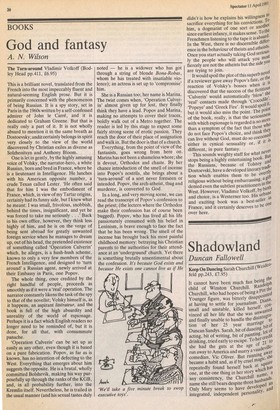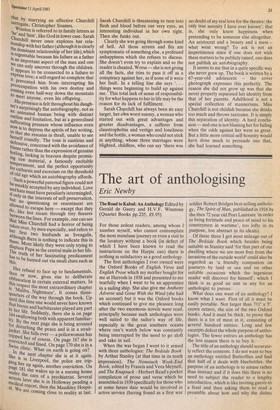Shadowland
Duncan Fallo well
Keep On Dancing Sarah Churchill (Weidehfeld pp.243, £7.95) It cannot have been much fun being ril,e child of Winston Churchill, Raild°113° Churchill, who had hopes of being a Pitt tilde Younger figure, was bitterly disapPointt at having to settle for journalism. Dart' small and unstable, killed herself, c°"ti vinced all her life that she was unwarite and finally unable to handle the disintegranon of her 25 year marriage . tof Duncan Sandys. Sarah, bit of dancing, hit 0f acting, bit of writing, bit of painting, 1°t. °.t drinking, tried early to escape. To her credi she had the guts at the age of 21.„t° run away to America and marry a vaudeville' comedian, Vic Oliver. But running. avi:e became a habit and, as if by cruel magic, repeatedly found herself back at Attar: one, at the one thing in her story which ha:, any consistency, the Churchill name, , name she still bears despite three husband!: Only Mary seems to have developed edu integrated, independent personalitY, an that by marrying an effective Churchill surrogate, Christopher Soames. Winston is referred to in family letters as 'he' and 'him', like God in lower case. Sarah Churchill never once explores her relationship with her father (although it is clearly the dominant relationship of her life),which is regrettable because his failure as a father iS an important aspect of the man and one we can only uncover through the children. It appears to be connected to a failure to express love; a self-regard so complete that it prevented him from interrupting his preoccupation with his own destiny and coming even half-way down the mountain to meet anyone, even his offspring. His presence is felt throughout his daughter's surprisingly flat autobiography, not as an animated human being with distinct outline and limitation, but as' a generalised suffocating pressure whose influence even now is to depress the spirits of her writing, sO that she remains in thrall, unable to see herself roundly. The tone is cautious and defensive, concerned with the avoidance of blame rather than the expression of genuine feeling, lacking in bravura despite promising raw material, a famously excitable temperament and the perfect opportunity for catharsis and exorcism on the threshold of old age which an autobiography affords. Such a powerful paternal figure could not be meekly accepted by any individual. Love and hate must have peculiarly intermingled, if only in the interests of self-preservation, Put no questioning or resentment are allowed to escape here — except that they do, like hot steam through tiny fissures between the lines. For example, one can see that Miss Churchill had a horror of being taken over, by men especially, and refers to her first two husbands as Svengalis, although there is nothing to indicate this in them. More likely they were only trying to „disPlace Papa as the central male in her life. ;the truth of her fascinating predicament has to be hunted out via small clues such as this, Her refusal to face up to fundamentals, then or now, gives rise to deliberate atio obfuscn in certain external matters. In this respect the most extraordinary chapter Is 'Malibu . Nightmare'. It comes threequarters of the way through the book. Up until this time one would never have known that booze and barbiturates played any part in her life. Suddenly, there she is on page . y B164 swallowing both with apparent familiary, the next page she is being arrested fa or disturbing the peace and is in a straitjacket. She falls over — a policewoman has tripped her of course. On page 167 she is convicted and fined. On page 170 she is in a Swiss clinic. What on earth is going on? She In the next chapter she is at it again. is in Liverpool, the police are tripPing her up again, another conviction. On Page 181 she wakes up in a nursing home under the care of a psychiatrist. Several arrests later she is in Holloway pending a medical report, then the Maudsley Hospital We are coming close to reality at last. Sarah Churchill is threatening to turn into flesh and blood before our very eyes, an interesting individual in her own right. Then she funks out.
Clearly she was going through some kind of hell. All those arrests and fits are symptomatic of something else, a profound unhappiness which she refuses to discuss. , She doesn't even try to explain and so the reader is cheated. Worse — she is not giving all the facts, she tries to pass it off as a conspiracy against her, as if none of it were her fault. In a telling line she says . . things were beginning to build up against me.' This total lack of sense of responsibility for what happens to her in life may be the r reason for its lack of fulfilment.
Sarah Churchill has always been MI easy target, her on worst enemy, a woman who started out with great advantages and greater disadvantages, a sufferer from claustrophobia and vertigo and loneliness and the bottle, a woman who could not stick at anything, whose three marriages were blighted, childless, who can say 'there was no doubt of my real love for the theatre: the only true serenity I have ever known'; that is, she only knew happiness when pretending to be someone else altogether. An aristocrat and a beauty and a mess what went wrong? To ask is not an impertinence since if one does not wish these matters to be publicly raised, one does not publish an autobiography.
It seems to me that in a quite specific way she never grew up. The book is written by a 67-year-old adolescent the cover photograph expresses this perfectly. The reason she did not grow up was that she never properly separated her identity from that of her parents. Adulthood is not a special collection of mannerisms. Miss Churchill is not childish because she drinks too much and throws tantrums. It is simply this separation of identity. A hard conclusion — and one is not blaming her for failing when the odds against her were so great. But a little more critical self-honesty would have done much to persuade one that, she had learned something.











































 Previous page
Previous page